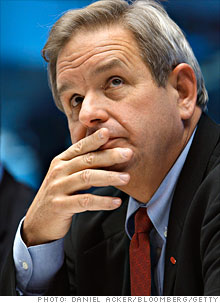Search News
FORTUNE -- Everyone is talking about creating more green jobs, but few people seem to know how to actually do it. That got Chad Holliday, the former CEO of DuPont and current chairman of Bank of America (BAC, Fortune 500), thinking about solutions. Earlier this year he helped form the American Energy Innovation Council (AEIC), a bipartisan group of business leaders who believe that the U.S. needs a long-term energy strategy to transition to a low-carbon economy and create American jobs. Besides Holliday, the council's seven members are Bill Gates, GE (GE, Fortune 500) CEO Jeff Immelt, Cummins (CMI, Fortune 500) CEO Tim Solso, Xerox (XRX, Fortune 500) CEO Ursula Burns, former Lockheed Martin (LMT, Fortune 500) CEO Norm Augustine, and John Doerr, a partner at the venture capital firm Kleiner Perkins. The AEIC is supported by the Bipartisan Policy Center and the ClimateWorks Foundation. Holliday spoke with Fortune's Brian Dumaine on how the AEIC will work.
What's the plan?
 |
| Chad Holliday: America needs a clean-energy policy. |
We drafted five recommendations. The heart of it is that we want the federal government to boost R&D investment in clean energy from $5 billion a year to $16 billion. That would fund not only basic research but also the creation of two or three technology clusters so research universities, government labs, and the private sector can work together. We also call for the creation of an independent national Energy Strategy Board to help move inventions from the labs to the marketplace.
Why do we need one?
The problem is, the free market hasn't taken care of our energy sector. We don't have a consistent, comprehensive energy plan. The bad news is that a lot of countries are spending more on energy R&D than the U.S. does. The good news is that nobody is there yet. No one is so far down the pike that it wouldn't make any sense for us to start. I can't imagine anything that would do more for U.S. competitiveness than if we could make a breakthrough in clean, cheap energy.
What about the critics who say this is industrial policy?
If we sat there and tried to pick winners and losers, we think it would be a big mistake. We're open to all technologies, including clean coal and nuclear. We believe strongly that the free market should make the decisions on which energy systems to pursue, butwe also believe the market needs the clarity and funds that the five recommendations of our program would provide.
Where will the money come from?
Funding anything at a stressful time like this is a challenge -- we're not kidding ourselves. Right now we're focusing on finding ways to reallocate money already in the federal budget. We view energy as a national security issue. If we took some money out of defense or medical research without hampering those programs, we could find the money we're looking for. I haven't come across much resistance yet from the politicians I've spoken to.
Why partner with Uncle Sam?
You just can't have projects where you're going to change direction every two or four years; R&D needs to be divorced from short-term political processes. Our Energy Strategy Board will make sure projects stay on track long term. The board will help create private-public partnerships where corporations will take inventions from government labs and invest the funds needed for scale-up. If this thing works, we'll attract a lot of private money around it.
What do you hope to accomplish?
Five years out I want to see at least three tech clusters running strong and a pipeline of 10 new technologies. By 10 years I hope we have some commercial prototypes. In the second decade we want to bring the price of energy down dramatically. We can't give a 100% guarantee we will get there, but if I asked Gates, Immelt, and other board members to bet their personal money on this, they'd bet yes -- we'll get there.
What keeps you up at night?
Well, we have to convince the American people that we really can make a revolutionary change and that they have to give us a couple of decades to get this thing done. We're not kidding ourselves that it isn't a difficult sell. But I'm very hopeful because it makes a lot of sense. ![]()






| Company | Price | Change | % Change |
|---|---|---|---|
| Ford Motor Co | 8.29 | 0.05 | 0.61% |
| Advanced Micro Devic... | 54.59 | 0.70 | 1.30% |
| Cisco Systems Inc | 47.49 | -2.44 | -4.89% |
| General Electric Co | 13.00 | -0.16 | -1.22% |
| Kraft Heinz Co | 27.84 | -2.20 | -7.32% |
| Index | Last | Change | % Change |
|---|---|---|---|
| Dow | 32,627.97 | -234.33 | -0.71% |
| Nasdaq | 13,215.24 | 99.07 | 0.76% |
| S&P 500 | 3,913.10 | -2.36 | -0.06% |
| Treasuries | 1.73 | 0.00 | 0.12% |
|
Bankrupt toy retailer tells bankruptcy court it is looking at possibly reviving the Toys 'R' Us and Babies 'R' Us brands. More |
Land O'Lakes CEO Beth Ford charts her career path, from her first job to becoming the first openly gay CEO at a Fortune 500 company in an interview with CNN's Boss Files. More |
Honda and General Motors are creating a new generation of fully autonomous vehicles. More |
In 1998, Ntsiki Biyela won a scholarship to study wine making. Now she's about to launch her own brand. More |
Whether you hedge inflation or look for a return that outpaces inflation, here's how to prepare. More |